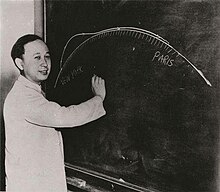Qian Xuesen
Qian Xuesen , ( Chinese 錢學森 / 钱学森 , Pinyin Qián Xuésēn , W.-G. Ch'ien Hsüeh-sên , outdated after Stange Tsien Hsue-sen, born December 11, 1911 in Hangzhou , China ; † October 31, 2009 in Beijing ) was a Chinese scientist. He is considered the "father of the Chinese space program", but has also played a key role in the development of American space technology.
Life
Qian studied at Jiaotong University in Shanghai from 1929 to 1934 , and in 1935 came to the Massachusetts Institute of Technology (MIT) in Cambridge on a scholarship and moved to the California Institute of Technology (Caltech) in Pasadena in 1936 . At Caltech, he fell quickly to a member of the Suicide Squad ( suicide squad ), a group of young engineers whose trials caused a stir because of frequent breakdowns explosion. Theodore von Kármán , pioneer of rocket technology at Caltech, discovered and promoted him.
When the American Army at Caltech in 1939 applied for support for a project to develop a launch rocket for bomber planes, Qian Xuesen was one of the party. In 1943 he was one of the editors of a project at Caltech that had the task of standing up to the German missile program. The acronym JPL , for Jet Propulsion Laboratory , was found for the first time in the text he was involved in . His clients quickly gained confidence in him and his work, so that he received accreditation for the United States Department of Defense for the most secret armaments projects . In 1945 he was sent to Germany. As part of the Paper Clip project , which aimed to take on the leading German researchers for the American missile program, he interrogated Wernher von Braun . After the Second World War, von Kármán campaigned for Qian to be admitted to the Air Force's Scientific Advisory Committee. “At the age of 36 he was an outstanding genius whose work provided enormous impetus for the progress in research into aerodynamics at high speeds and jet propulsion,” said von Kármán of Qian. William Hayward Pickering called Qian Xuesen the “best student of Kármáns.” He was known for his rigor among his students at Caltech. In 1949 he was elected to the American Academy of Arts and Sciences .
However, when Qian Xuesen applied for American citizenship in 1950, McCarthy supporters accused him of sympathizing with communism during the 1930s. All accreditations were withdrawn from him. When the scientist with the rank of colonel decided to return to China, feared the betrayal of military secrets, he was arrested and house arrested in Honolulu. He was held until 1955. Xuesen finally wrote a letter to Zhou Enlai , then Prime Minister of the People's Republic of China. Finally he was allowed to travel to China in exchange for American prisoners of war from the Korean War .
There he immediately placed himself in the service of the young state by joining the Communist Party ruling there. He founded the first Chinese space research institute, which was initially equipped with very modest resources. He worked for the Ministry of Defense, worked on the development of the first Chinese atomic bomb , detonated in 1964 , and on the development of launch vehicles for nuclear weapons.
Qian was also credited with making the first Chinese satellite into orbit around the earth in 1970. He was also significantly involved in the development of the Long Marsch missile ; He is also acknowledged that he laid the foundations for the first manned Chinese space mission to be carried out successfully in 2003 and for the first Chinese lunar probe to reach Earth's satellite in 2007.
A dark point in his life's work are his erroneous calculations of the crop yields during the great leap forward in 1958: They helped to disguise the emerging famine and justify bloody measures against members of the rural population who were accused of concealing crop yields. He was a loyal member of the Communist Party; As expected, in 1989 he was one of those who condemned the demonstrations in Tian'anmen Square and defended the actions of the state power.
The Chinese people played a major role in his death. Crowds huddled in front of his coffin; Chinese bloggers and chatters paid homage to him as a superstar .
The asteroid (3763) Qianxuesen was named after him in 2001.
literature
- Hervé Morin, Bruno Philip: Qian Xuesen, scientifique chinois . In: Le Monde . November 5, 2009, p. 29 ( lemonde.fr ).
- Jane Qiu: Qian Xuesen (1911-2009). Founder of China's missile and space program. Nature , Volume 462, 2009, p. 735. doi: 10.1038 / 462735a
- Karl-Eugen Kurrer : The History of the Theory of Structures. Searching for Equilibrium , Ernst & Sohn 2018, p. 1070f (biography), ISBN 978-3-433-03229-9 .
- 孙家栋: 钱学森 的 航天 岁月.中国 宇航 出版社, 北京 2011. ISBN 978-7-515-90106-0 .
Obituaries
- "Father of Chinese Space Travel" died , China Internet Information Center
- Qian Xuesen obituary , The Guardian
- Qian Xuesen, Father of China's Space Program, Dies at 98 New York Times, November 3, 2009
Web links
- Qian Xuesen Library and Museum (English)
Individual evidence
- ^ A b Sparrow, Giles., Evening, Bernhard ,: Adventure space travel: [50 years of expeditions into space] . Dorling Kindersley, Munich 2007, ISBN 978-3-8310-1089-9 .
- ^ Thomas Caughey, Oral History Interview . He was nicknamed the Chinese Dragon
- ↑ Minor Planet Circ. 43188
| personal data | |
|---|---|
| SURNAME | Qian Xuesen |
| ALTERNATIVE NAMES | Tsien Hsue-shen; Hsue-shen Tsien |
| BRIEF DESCRIPTION | Sino-American rocket engineer, space pioneer |
| DATE OF BIRTH | December 11, 1911 |
| PLACE OF BIRTH | Hangzhou |
| DATE OF DEATH | October 31, 2009 |
| Place of death | Beijing |

